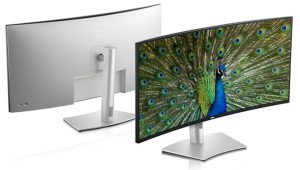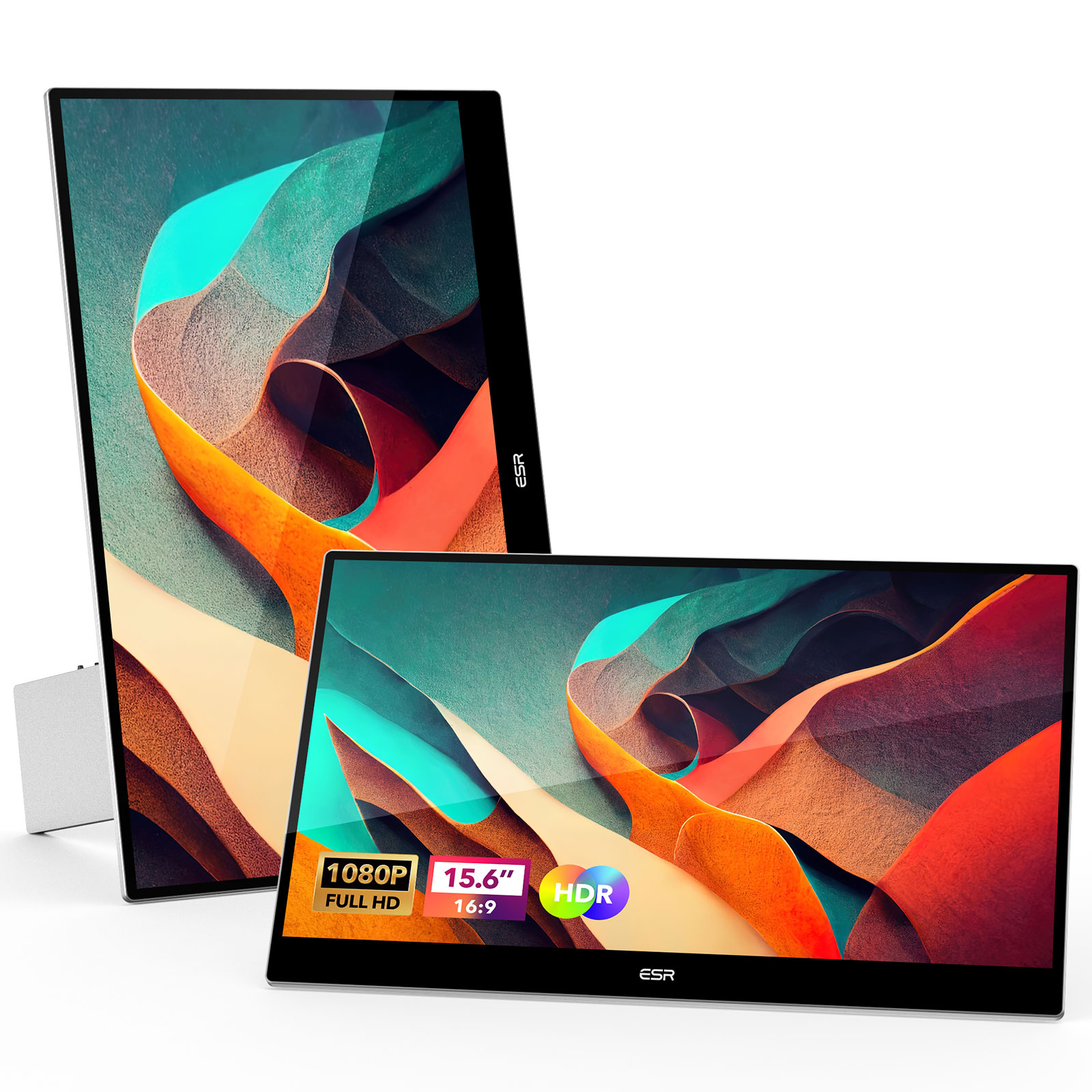Traditional monitors have been the standard in many offices and homes for years, but portable ones are becoming more popular due to their convenience and flexibility. With portable monitors, you can extend your screen almost anywhere since they are compact and easy to carry. That notwithstanding, traditional monitors still have their place in certain situations.
In this article, we’ll compare portable and traditional monitors using some parameters. Hopefully, this will help you decide which is better for your needs. But first, let’s consider what portable monitors are.
Portable Monitors
As the name suggests, portable monitors are lightweight and easy to carry around. They’re typically smaller than traditional monitors, requiring USB or battery powering. As a result, portable monitors are ideal for people who need to work on the go or have limited space. If you’re searching for a practical portable monitor for whatever purpose, here is a worthy recommendation.
ESR Kickstand Portable Monitor – $199.99
The Kickstand Portable Monitor from ESR is an excellent option if you need a portable monitor for work or play. This monitor features a 15.6-inch IPS display with a 1080p resolution and a 60Hz refresh rate. In addition, it’s compatible with Windows and Mac devices and can power using a USB or battery.
One of the standout features of this monitor is its built-in kickstand, which allows you to prop it up on any surface. With this kickstand, you can quickly set it up anywhere, whether in a coffee shop or plane. In addition, it is adjustable so that you can find the perfect viewing angle.
Related article:
The 5 Best Portable Monitors For Laptop
Traditional Monitors

Traditional monitors are larger and typically more expensive than portable ones. Therefore, they are best suited for a fixed location like an office or home. In addition, traditional monitors are ideal for people working with multiple windows or applications simultaneously and require high resolution and color accuracy.
Portable Monitors vs. Traditional Monitors Comparison
1 Portability and Flexibility – Winner: Portable Monitors
Portable monitors are lightweight and easy to carry around, making them ideal for travelers and students. In addition, they can easily fit into a backpack or laptop bag, making them an excellent option for people who need to work remotely or travel frequently.
The Kickstand Portable Monitor from ESR is an excellent example of a portable monitor that offers both portability and flexibility. This monitor features a 15.6-inch Full HD IPS display, a built-in kickstand, and a lightweight design that makes it easy to carry around. In addition, it’s compatible with a wide range of devices, including laptops, smartphones, and gaming consoles, making it a versatile option for anyone who needs a portable display.
2. Display Quality – Winner: Traditional Monitors
Traditional monitors generally offer better picture quality and color accuracy than portable monitors; they feature larger screens and higher resolutions. However, portable monitors have come a long way in recent years and can now offer comparable display quality to traditional monitors.
For instance, the Kickstand Portable Monitor from ESR offers a Full HD IPS display, which provides excellent color accuracy and wide viewing angles. It also features a slim bezel design that maximizes the real estate screen and provides an immersive viewing experience.
While it may not match the display quality of a high-end traditional monitor, it’s a great option for anyone who needs a portable display with good picture quality. In addition, the Kickstand Portable Monitor is also priced at $329.99, making it an affordable option for anyone needing a portable display.
3. Connectivity – Winner: Traditional Monitors
Another factor to consider when choosing between portable monitors and traditional monitors is connectivity. Traditional monitors often offer a wider range of connectivity options, including HDMI, DisplayPort, and VGA. On the other hand, portable monitors may be more limited regarding connectivity options.
The Kickstand Portable Monitor from ESR offers a range of connectivity options, including USB-C, mini-HDMI, and 3.5mm audio. It also comes with a USB-C to USB-C cable and a mini-HDMI to HDMI cable, making it easy to connect to a wide range of devices. While it may not offer the same connectivity options as a traditional monitor, it’s great for anyone needing a portable display to connect to multiple devices.
4. Screen Size and Resolution – Winner: Traditional Monitor
Traditional monitors generally have the edge regarding screen size and resolution. That’s because they come in a wide range of sizes – 19 to 34 inches or more. They also offer high resolutions such as 4K or even 8K, making them ideal for tasks requiring many screen real estates, such as video editing or graphic design.
However, portable monitors are catching up in this area, with many models now offering Full HD (1080p) or even 4K resolutions. The Kickstand Portable Monitor, for example, has a 15.6-inch IPS screen with a Full HD resolution of 1920 x 1080 pixels.
5. Power Consumption – Winner: Portable Monitors
Traditional monitors can consume much power, especially if they are large and have high resolutions. As a result, using a laptop or other portable device with limited battery life can be a problem. On the other hand, portable monitors are energy-efficient, requiring a single USB-C cable for powering. The Kickstand Portable Monitor, for example, can be powered by a USB-C cord from a laptop or other device, which makes it very convenient for on-the-go use.
6. Compatibility – Winner: Portable Monitors
Another factor to consider is compatibility. Traditional monitors typically connect to your computer or laptop using HDMI or VGA cables. On the other hand, portable monitors often come with USB-C or Thunderbolt 3 ports, making them compatible with a broader range of devices, including smartphones and tablets. For example, the Kickstand Portable Monitor from ESR Gear has USB-C and HDMI ports, so you can easily connect it to your laptop, smartphone, or gaming console.
7. Price – Winner: Traditional Monitors
Finally, the price is another important consideration when choosing between a portable and a traditional monitor. Traditional monitors range in price from less than $100 to thousands of dollars, depending on the size, resolution, and features. Portable monitors are generally more expensive than traditional monitors of a similar size and resolution, but they offer the added convenience of portability. The Kickstand Portable Monitor, for example, is priced at $199.99, which is on par with other high-quality portable monitors.
Conclusion
Portable and traditional monitors have strengths and weaknesses. If you value portability and convenience, a portable monitor like the Kickstand Portable Monitor from ESR Gear is an excellent choice.
However, a traditional monitor may be better for you if you require a larger screen size, higher resolution, or a wide range of connectivity options. Choosing between a portable and a conventional monitor will depend on your specific needs and preferences.
You May Also Like to Read:
The Best USB-C Hubs and Docks for the iPad Pro and iPad Air
What is the Difference Between a USB-C Hub, Docking Station, and an Adapter?




